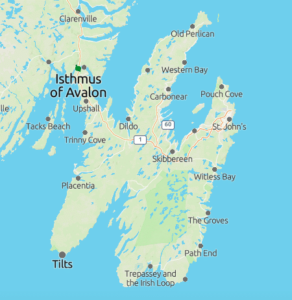Joshua Barrett is a Senior Policy Analyst with the Government of Newfoundland and Labrador. Joshua holds a Bachelor of Arts in Geography and Political Science, and a Master of Arts in Geography from Memorial University of Newfoundland. He is the current Blog Editor for the RSA Blog. Josh is active on twitter through the handle @joshbarrett92.
While the journey we take to work likely does not quite align with the classic J. R. R. Tolkien tale The Hobbit, it is undeniable that the commute that many residents take in Newfoundland and Labrador (NL) has significant implications on regional sustainability for the province.
Indeed, mobile working arrangements have increased globally, where the commute of an individual can range from a short, daily commutes, to longer absences last days, weeks, or even months across regions, provinces, or even internationally. Such increased increased emphasis of labour mobility, particularly in the social and cultural context of mobility, led to what has been referenced as the ‘mobilities turn’ in literature throughout the 1990s and 2000s.
For the case of NL, commuting for work is not new; historically, residents on the island of Newfoundland would travel to Labrador to work in the fishery during the summer months, and return home to the island in the winter. With the establishment of a moratorium on cod in 1992, 30,000 residents were left unemployed, forcing individuals to either leave the province to find work elsewhere or utilize mobile work arrangements to provide for their families.

Figure 1. Map of the Avalon Isthmus.
More recently, since 2005, the Avalon Isthmus has become a regional hub for industrial activity in NL, ranging from the construction of large-scale projects for the offshore oil and gas sector, to oil and gas refining, as well as mineral processing operations all within a 50-kilometer radius. The Isthmus region is also predominantly rural, resulting in local labour market challenges when companies are searching for skilled labour. As such, the majority of workers are required to commute over one hour to the worksite each way, either driving by themselves or carpooling with coworkers.
Research has documented that the commute, in combination with 12-hour workdays, leaves little time for mobile workers to invest their time, money, or resources in their source communities, or the communities where residents permanently reside. Rural communities are in particular the most vulnerable, where they struggle to find volunteers for the local fire department, run in municipal politics, or assist with educational or recreational programming.

Figure 2. Photo of Long Harbour, NL, a host community in the Avalon Isthmus. (Photo credit: Heather Hall).
In contrast, host communities, or regions that host large-scale projects, reap significant benefits from these projects. The increased revenue to a small, municipal tax base has allowed rural communities in parts of NL to thrive and cater more effectively to the needs of their residents. In recent years, however, there have been concerns issued by residents regarding whether the negotiations of the industrial benefit agreements between the company and the community were actually in the best interest of the municipality, and if there could be a better outcome for the host community.
Central to these issues is the act and practice of labour mobility. Although extended travel for work takes the human capital out of source communities for a period of time, employment mobility has been noted as a means of survival for rural communities. The Avalon Isthmus and surrounding communities has been a regional hub for industrial activity (and subsequently mobile activity) for over a decade, and it will likely continue in the future. Regions need to become better equipped to deal with and face the challenges associated with labour mobility, and prosper on the opportunity of having a permanent (albeit predominantly mobile) residents living within their communities.
Are you currently involved with regional research, policy, and development, and want to elaborate your ideas in a different medium? The Regional Studies Association is now accepting articles for their online blog. For more information, contact the Blog Editor at RSABlog@regionalstudies.org.